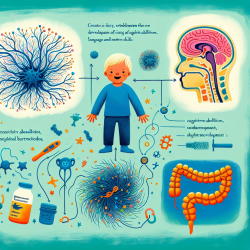Introduction
In the realm of speech-language pathology and early childhood development, the gut microbiome has emerged as a critical area of study. Recent research, such as the study by Tamana et al., has highlighted the potential impact of the Bacteroides-dominant gut microbiome on neurodevelopmental outcomes in infants. This blog aims to explore the implications of these findings and how practitioners can leverage this knowledge to enhance developmental outcomes in children.
The Study: Key Findings
The research conducted by Tamana et al. involved 405 infants and analyzed the composition of their gut microbiota at 4 and 12 months of age. The study found that infants with a Bacteroides-dominant gut microbiome at 12 months exhibited significantly higher scores in cognitive, language, and motor development at age 2 compared to those with a Proteobacteria-dominant microbiome. Notably, these associations were more pronounced in male infants.
Implications for Practitioners
For practitioners in speech-language pathology and related fields, these findings underscore the importance of considering gut health as part of a holistic approach to child development. Here are some practical steps practitioners can take:
- Educate Parents: Inform parents about the potential impact of gut health on their child's development. Encourage practices that promote a healthy gut microbiome, such as breastfeeding and a balanced diet.
- Collaborate with Healthcare Providers: Work closely with pediatricians and dietitians to monitor and support the gut health of infants, especially those at risk of developmental delays.
- Encourage Further Research: Stay informed about ongoing research in this area and consider participating in studies that explore the gut-brain connection in children.
Encouraging Further Research
While the study by Tamana et al. provides valuable insights, there is still much to learn about the gut-brain axis and its role in neurodevelopment. Practitioners are encouraged to advocate for and engage in further research to deepen our understanding of these complex interactions.
Conclusion
The findings from the study on the Bacteroides-dominant gut microbiome offer promising avenues for enhancing neurodevelopmental outcomes in children. By integrating this knowledge into practice, speech-language pathologists and other professionals can contribute to more comprehensive and effective developmental support for children.
To read the original research paper, please follow this link: Bacteroides-dominant gut microbiome of late infancy is associated with enhanced neurodevelopment.










